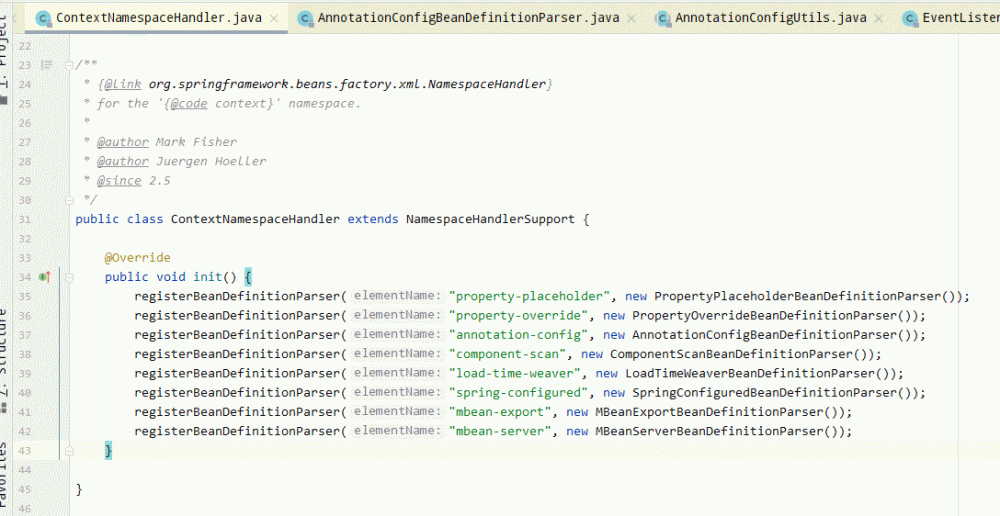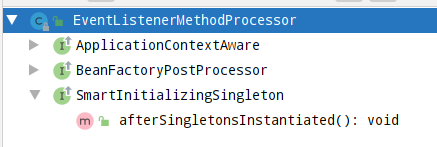spring,springBoot事件
这个系列分为5篇
1. @Component,@Service等注解是如何被解析的
2. @Enableq驱动原理(最晚20200705)
3. @EnableAutoConfiguration处理逻辑
4. spring,springBoot事件
5.自定义springboot starter(最晚20200726)
引言
spring事件机制,有3个核心部分,事件,监听方式,广播器,下面我们分别介绍。
Spring事件
spring的事件的API对应ApplicationEvent。它继承了ava.util.EventObject。显示调用父类构造器传递事件源。
public abstract class ApplicationEvent extends EventObject {
///省略其他代码
public ApplicationEvent(Object source) {
super(source);
this.timestamp = System.currentTimeMillis();
}
//省略其他代码
}复制代码
Spring内置事件
| 事件名 | 注释 |
| ContextRefreshedEvent | Spring应用上下文就绪事件 |
| ContextStartedEvent | Spring应用上下文启动事件 |
| ContextStopedEvent | Spring应用上下文停止事件 |
| ContextClosedEvent | Spring应用上下文关闭事件 |
允许泛型事件自定义,如果有兴趣可以参看: org.springframework.context.PayloadApplicationEvent
Spring事件监听手段
2种监听手段
1. 实现ApplicationListener接口 或 @EventListener,可监听1到多种事件,支持泛型事件
2. @EventListener方法上@Async,可使用@EventListener方法异步化,但是被注解的方法的返回值应该为void,其实返回值没有意义。
表@EventListener的同步与异步区别
| 方法类型 | 访问修饰符 | 返回类型 | 参数数量 | 参数类型 | 备注 |
| 同步 | public | 任意类型 | 0或1 | 监听事件类 型或其子类 |
会将返回值 作为事件向 后传播 |
| 异步 | public | void | 0或1 | 监听事件类 型或其子类 |
如果出错不 会传播给调 用者。 不会向后传 播事件 |
@EventListener原理
找入口

EventListenerMethodProcessor 就是处理@EventListener注解的入口类
找主要方法
1.将@
EventListener方法转换为
ApplicationListener示例
2.实现
BeanFactoryPostProcessor用于检索
EventListenerFactory
避免AOP增强,EventListenerFactory
在查看, EventListenerMethodProcessor的类图

ApplicationContextAware 用于注入ApplicationContext。
BeanFactoryPostProcessor根据类注释可知用于获取EventListenerFactory。
这里最需要关注的应该是SmartInitializingSingleton#afterSingletonsInstantiated方法。
查看该方法的注释
public interface SmartInitializingSingleton {
/**
* 预实例化完成之后调用,保证所有常规单例Bean创建完毕
* 调用ListableBeanFactory#getBeansOfType没有任何副作用
* 注意:
* 对于延迟加载的单例Bean,不会触发这个回调。
* 并且其他作用域的Bean,也不会触发这个回调。
* 谨慎使用,应仅用于引导功能。
*/
void afterSingletonsInstantiated();
}复制代码
afterSingletonsInstantiated 从方法注释上可以看出,这个方法可以用于引导功能。
查看源码EventListenerMethodProcessor ,逻辑就是找BeanName和Bean对应的Type,具体逻辑委托给 processBean,下面是processBean的源码
public class EventListenerMethodProcessor {
//省略其他部分
private void processBean(final String beanName, final Class<?> targetType) {
if (!this.nonAnnotatedClasses.contains(targetType) &&
!targetType.getName().startsWith("java") &&
!isSpringContainerClass(targetType)) {
Map<Method, EventListener> annotatedMethods = null;
try {
//找出所有EventListener注解的方法
annotatedMethods = MethodIntrospector.selectMethods(targetType,
(MethodIntrospector.MetadataLookup<EventListener>) method ->
AnnotatedElementUtils.findMergedAnnotation(method, EventListener.class));
}
catch (Throwable ex) {
// An unresolvable type in a method signature, probably from a lazy bean - let's ignore it.
if (logger.isDebugEnabled()) {
logger.debug("Could not resolve methods for bean with name '" + beanName + "'", ex);
}
}
if (CollectionUtils.isEmpty(annotatedMethods)) {
this.nonAnnotatedClasses.add(targetType);
if (logger.isTraceEnabled()) {
logger.trace("No @EventListener annotations found on bean class: " + targetType.getName());
}
}
else {
// Non-empty set of methods
ConfigurableApplicationContext context = this.applicationContext;
Assert.state(context != null, "No ApplicationContext set");
List<EventListenerFactory> factories = this.eventListenerFactories;
Assert.state(factories != null, "EventListenerFactory List not initialized");
for (Method method : annotatedMethods.keySet()) {
for (EventListenerFactory factory : factories) {
if (factory.supportsMethod(method)) {
Method methodToUse = AopUtils.selectInvocableMethod(method, context.getType(beanName));
//通过EventListenerFactory转换为ApplicationListenerMethodAdapter
ApplicationListener<?> applicationListener =
factory.createApplicationListener(beanName, targetType, methodToUse);
if (applicationListener instanceof ApplicationListenerMethodAdapter) {
((ApplicationListenerMethodAdapter) applicationListener).init(context, this.evaluator);
}
//将该事件监听器注册到应用上下文中。
context.addApplicationListener(applicationListener);
break;
}
}
}
if (logger.isDebugEnabled()) {
logger.debug(annotatedMethods.size() + " @EventListener methods processed on bean '" +
beanName + "': " + annotatedMethods);
}
}
}
}
}复制代码
AopUtils.selectInvocableMethod 是不允许访问,私有方法,静态方法,代理的方法,也就印证了 @EventListener 必须用public修饰
概要逻辑
1.这个方法的逻辑就是将@EventListener的方法,
EventListenerFactory转换为
3.该事件监听器注册上线文中。
@EventListener总结
1. EventListenerMethodProcessor 是@EventListener的生命周期处理器,实现了 SmartInitializingSingleton接口的afterSingletonsInstantiated 方法,进行了:
- 这个方法的逻辑就是将@EventListener的方法,
-
EventListenerFactory转换为
- 该事件监听器注册上线文中。
2. DefaultEventListenerFactory是@EventListener方法与ApplicationListener的适配工厂
3. ApplicationListenerMethodAdapter为适配类。
Spring的广播器
广播器为ApplicationEventMulticaster,它的默认实现为SimpleApplicationEventMulticaster
它主要有2个责任,维护ApplicationListener关联关系这个比较简单,我们关注下广播消息。
@Override
public void multicastEvent(final ApplicationEvent event, @Nullable ResolvableType eventType) {
ResolvableType type = (eventType != null ? eventType : resolveDefaultEventType(event));
Executor executor = getTaskExecutor();
for (ApplicationListener<?> listener : getApplicationListeners(event, type)) {
if (executor != null) {
executor.execute(() -> invokeListener(listener, event));
}
else {
invokeListener(listener, event);
}
}
}复制代码
调用getApplicationListeners,遍历调用onApplicationEvent(ApplicationEvent)。
查看getApplicationListeners方法在其父类 AbstractApplicationEventMulticaster中。
protected Collection<ApplicationListener<?>> getApplicationListeners(
ApplicationEvent event, ResolvableType eventType) {
Object source = event.getSource();
Class<?> sourceType = (source != null ? source.getClass() : null);
ListenerCacheKey cacheKey = new ListenerCacheKey(eventType, sourceType);
// Quick check for existing entry on ConcurrentHashMap...
ListenerRetriever retriever = this.retrieverCache.get(cacheKey);
if (retriever != null) {
return retriever.getApplicationListeners();
}
if (this.beanClassLoader == null ||
(ClassUtils.isCacheSafe(event.getClass(), this.beanClassLoader) &&
(sourceType == null || ClassUtils.isCacheSafe(sourceType, this.beanClassLoader)))) {
// Fully synchronized building and caching of a ListenerRetriever
synchronized (this.retrievalMutex) {
retriever = this.retrieverCache.get(cacheKey);
if (retriever != null) {
return retriever.getApplicationListeners();
}
retriever = new ListenerRetriever(true);
Collection<ApplicationListener<?>> listeners =
retrieveApplicationListeners(eventType, sourceType, retriever);
this.retrieverCache.put(cacheKey, retriever);
return listeners;
}
}
else {
// No ListenerRetriever caching -> no synchronization necessary
return retrieveApplicationListeners(eventType, sourceType, null);
}
}复制代码
内部维护一个final Map<ListenerCacheKey, ListenerRetriever> retrieverCache 维护事件类型与数据源的类型
ListenerCacheKey为eventType(对应泛型或者事件类本身) 和sourceType(ApplicationEvent构造器中的source),(对应ApplicationEvent)。
SimpleApplicationEventMulticaster总结:
1. SimpleApplicationEventMulticaster承担2个职责,关联ApplicationListener,广播ApplicationEvent。
2。 SimpleApplicationEventMulticaster 内部维护一个final Map<ListenerCacheKey, ListenerRetriever> retrieverCache 维护事件类型与数据源的类型
3. ListenerCacheKey为eventType(对应泛型或者事件类本身) 和sourceType(ApplicationEvent构造器中的source)
4. ListenerRetriever是AbstractApplicationEventMulticaster的内部类,对应ApplicationListener集合
5 .ApplicationEventMulticaster广播事件,multicastEvent(ApplicationEvent)和multicastEvent(ApplicationEvent,ResolvableType)
内部调用getApplicationListeners,遍历调用onApplicationEvent(ApplicationEvent)
补充说明:
通过ApplicationEventPublisherAware获得的ApplicationEventPublisher,是什么?
解决这个,就需要查看ApplicationContextAwareProcessor#postProcessBeforeInitialization
内部调用了 invokeAwareInterfaces方法,处理各种Aware接口的注入逻辑。
private void invokeAwareInterfaces(Object bean) {
if (bean instanceof EnvironmentAware) {
((EnvironmentAware) bean).setEnvironment(this.applicationContext.getEnvironment());
}
if (bean instanceof EmbeddedValueResolverAware) {
((EmbeddedValueResolverAware) bean).setEmbeddedValueResolver(this.embeddedValueResolver);
}
if (bean instanceof ResourceLoaderAware) {
((ResourceLoaderAware) bean).setResourceLoader(this.applicationContext);
}
if (bean instanceof ApplicationEventPublisherAware) {
((ApplicationEventPublisherAware) bean).setApplicationEventPublisher(this.applicationContext);
}
if (bean instanceof MessageSourceAware) {
((MessageSourceAware) bean).setMessageSource(this.applicationContext);
}
if (bean instanceof ApplicationContextAware) {
((ApplicationContextAware) bean).setApplicationContext(this.applicationContext);
}
}复制代码
看到这里,答案就有了。ApplicationEventPublisherAware所获得的ApplicationEventPublisher实例就是当前的ApplicationContext。
简述Spring Boot事件
Springboot事件
SpringBoot事件继承ApplicationEvent,也是SpringApplicationEvent的子类
SpringBoot事件源是SpringApplication,内部事件根据EventPublishingRunListener的生命周期回调方法依次发布。
ApplicationStartingEvent 1.5出现
ApplicationEnvironmentPreparedEvent
ApplicationPreparedEvent
ApplicationStartedEvent
ApplicationReadyEvent, spring应用上下文之后发布
ApplicationFailedEvent, spring应用上下文之后发布
Spring Boot事件监听手段
SpringApplication关联的SpringApplication关联ApplicationListener
1.class-path下,META-INF/spring.factories资源中的ApplicationListener对象集合
2.SpringApplication#addListeners(...)或SpringApplicationBuilder#listeners(...)显示装配
Spring Boot的广播器
SimpleApplicationEventMulticaster,是特定的,2.0以后不与spring framework共用。
- 本文标签: Collection 注释 value ConcurrentHashMap ask 翻译 Service UI 解析 springboot 总结 ACE IO 代码 key HashMap DDL ssl 处理器 map App Spring Boot final 类图 strace https executor API 实例 EnableAutoConfiguration src java message cat id CTO 参数 synchronized 生命 tab cache IDE Select Lua build spring 监听器 find AOP CEO list 静态方法 http 源码 bean 数据 遍历 bug 同步 Listeners tar
- 版权声明: 本文为互联网转载文章,出处已在文章中说明(部分除外)。如果侵权,请联系本站长删除,谢谢。
- 本文海报: 生成海报一 生成海报二











![[HBLOG]公众号](https://www.liuhaihua.cn/img/qrcode_gzh.jpg)

